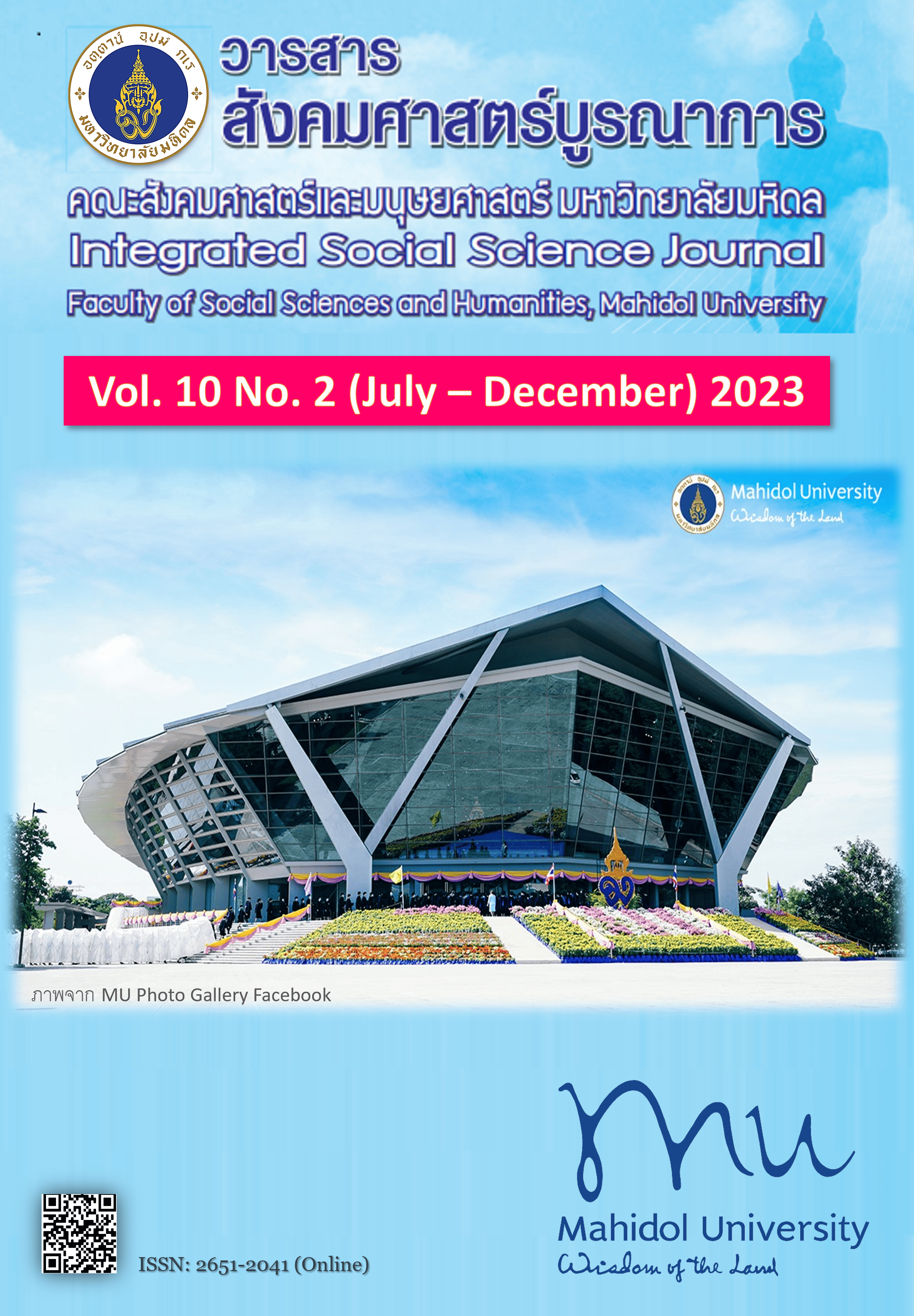นิยามใหม่ของห่วงโซ่การศึกษา เพื่อเป้าหมายการพัฒนาอย่างยั่งยืน
Main Article Content
บทคัดย่อ
การศึกษาครั้งนี้มีวัตถุประสงค์เพื่อสังเคราะห์ข้อมูลจากเอกสารทางวิชาการ สำหรับการกำหนดคำนิยามใหม่ของห่วงโซ่การศึกษา ซึ่งหมายถึง เครือข่ายความสัมพันธ์ระหว่างสถานศึกษา ที่มีหน้าที่ในการขับเคลื่อนหลักสูตรแกนกลางการศึกษาขั้นพื้นฐาน ไปพร้อมกับการออกแบบหลักสูตรสถานศึกษา ให้สอดคล้องกับทิศทางการพัฒนาของสังคมและประเทศ โดยมีครูผู้สอนทำหน้าที่เป็นกลไกเชื่อมโยงและถ่ายทอดองค์ความรู้ให้แก่ผู้เรียน ได้เข้าใจถึงคุณค่า และความถนัดเฉพาะของตนเอง ใช้ชีวิตอย่างมีความสุข และสามารถสร้างสรรค์สังคมให้เกิดการเปลี่ยนแปลงไปในทิศทางที่ดีมากยิ่งขึ้น ซึ่งห่วงโซ่การศึกษา ควรแบ่งออกเป็นสามระยะ ตั้งแต่การกำหนดคุณภาพการศึกษา กระบวนการศึกษา และผลสัมฤทธิ์ด้านการศึกษา ทั้งนี้ การนำไปบูรณาการเพื่อการพัฒนาอย่างยั่งยืน เป็นการมองในมุมกลับโดยให้ความสำคัญกับผู้เรียนมากที่สุด ซึ่งมุ่งเน้นให้เกิดการสร้างและกระจายตัวขององค์ความรู้ที่อยู่ในตัวของผู้เรียน ผ่านคุณค่าเชิงอัตลักษณ์ ประกอบกับเป็นการสร้างแรงกระเพื่อมของโอกาส และกระตุ้นให้เกิดการเปลี่ยนผ่านทางความคิดและค่านิยม ตั้งแต่ระดับนักเรียนผู้เป็นปัญญาชน ไปสู่ผู้ใหญ่ในสังคมที่มีบทบาทหน้าที่ในการบริหารประเทศ ดังนั้น การพัฒนาอย่างยั่งยืน จึงเป็นกระบวนการส่งมอบคุณค่าแก่ผู้เรียนเพื่อผลักดันให้เกิดการส่งต่อคุณค่าใหม่ในสังคม โดยถือเป็นการไหลเวียนขององค์ความรู้และคุณค่า ให้มีอยู่ในสังคมและประเทศตลอดไป
Article Details

อนุญาตภายใต้เงื่อนไข Creative Commons Attribution-NonCommercial-NoDerivatives 4.0 International License.
- วารสารสังคมศาสตร์บูรณาการ มหาวิทยาลัยมหิดล อนุญาตให้สามารถนำไฟล์บทความไปใช้ประโยชน์และเผยแพร่ต่อได้ โดยอยู่ภายใต้เงื่อนไขสัญญาอนุญาต CC Attribution-NonCommercial-NoDerivatives 4.0 International (CC BY-NC-ND 4.0) โดยต้องแสดงที่มา/การอ้างอิงจากวารสาร – ไม่ใช้เพื่อการค้า – ห้ามแก้ไขดัดแปลงเนื้อหา
- ข้อความที่ปรากฏในบทความในวารสารฯ เป็นความคิดเห็นส่วนตัวของผู้เขียนแต่ละท่าน ไม่เกี่ยวข้องกับกองบรรณาธิการวารสารฯ (ซึ่งหมายรวมถึง บรรณาธิการ ผู้ทรงคุณวุฒิในกองบรรณาธิการ หรือ บรรณาธิการรับเชิญ) แต่อย่างใด ความรับผิดชอบองค์ประกอบทั้งหมดของบทความแต่ละเรื่องเป็นของผู้เขียนแต่ละท่าน หากมีความผิดพลาดใด ๆ ผู้เขียนแต่ละท่านจะรับผิดชอบบทความของตนเอง ตลอดจนความรับผิดชอบด้านเนื้อหาและการตรวจร่างบทความเป็นของผู้เขียน ไม่เกี่ยวข้องกับกองบรรณาธิการวารสารฯ
- กองบรรณาธิการขอสงวนสิทธิ์ในการตัดทอน/ปรับแก้ถ้อยคำบางประการเพื่อความเหมาะสม
เอกสารอ้างอิง
Ayra, M., & Kosterelioglu, I. (2021). Effect of the lesson study practice on student’s academic achievements in life sciences course. Educational Policy Analysis and Strategic Research, 16(1), 249-270. https://doi.org/10.29329/epasr.2020.334.14
Bolt, N. (2011). Academic achievement. In S. Goldstein & J. A. Naglieri (Eds.), Encyclopedia of child behavior and development (pp. 8–9). Springer. https://doi.org/10.1007/978-0-387-79061-9_20
Bruner, J. S. (1977). The process of education. Library of Congress Catalog.
Gomez, A. B., & Portela, A. (2023). School dynamics and their role in the educational trajectories of at-risk students. European Journal of Educational Research, 12(1), 493-505. https://doi.org/10.12973/eu-jer.12.1.493
Harris, P. C., Bennett, R., Hines, E. M., Mayes, R. D., & Vega, D. (2016). Achievement gap: A look back and a way forward. JV Journal of Educational Research and Interdisciplinary Studies, 1(2), 7-15.
Holmes, A. G. (2019). Learning outcomes – A good idea, yet with problems and lost opportunities. Educational Process International Journal, 8(3), 159-169. https://doi.org/10.22521/edupij.2019.83.1
Hwa, Y., & Leaver, C. (2021). Management in education system. Oxford Review of Economic Policy, 37(2), 357-391. https://doi.org/10.1093/oxrep/grab004
Jeyagowri, K., & Ilankumaran, M. (2018). The role of students in transition from school to college: Different challenges in Elt. International Journal of Engineering & Technology, 7(4), 630-635. https://doi.org/10.14419/ijet.v7i4.36.24213
Kumar, G., & Mohapatra, S. (2021). Role of education for sustainable development. Sodha Pravaha, 8(11), 371-377.
Kumar, M. (2017). Importance of intrinsic and instrumental value of education in Pakistan. Journal of Education and Educational Development, 4(2), 177-199.
Mahapoonyanont, N. (2022). How to reduce educational inequality in Thailand, lesson from Vietnam, Indonesia and New Zealand. Journal of Positive School Psychology, 6(5), 2907-2912.
Merwe, A. V., & Cronje, J. (2004). The educational value as a modelling tool re-engineering efforts [Conference presentation]. The 3rd International Symposium on Information and Communication Technologies. Las Vegas, Nevada, USA. https://doi.org/10.1145/1071509.1071534
Mohammed, O., Rida, N., & Chafiq, T. (2021). Overview of e-learning platforms for teaching and learning. International Journal of Recent Contributions from Engineering Science and IT, 9(1), 50-70. https://doi.org/10.3991/ijes.v9i1.21111
Molagun, E. H. M. (2006). Education: An indispensable tool for human development. Ilorin Journal of Teacher Education, 3(1), 1-8.
Muller, T., & Placek, T. (2015). Defining determinism. The British Journal for the Philosophy of Science, 1-43. https://doi.org/10.1093/bjps/axv049
OECD. (2019). Quality education for all: Lessons and future priorities. OECD Development Centre.
Office of the Permanent Secretary. (2017). Thailand’s voluntary national review on the implementation of the 2030 agenda for sustainable development. Office of the Permanent Secretary.
Ozcan, M. (2021). Factor affecting students’ academic achievement according to the teachers’ opinion. Education Reform Journal, 6(1), 1-18. ttps://doi.org/10.22596/erj2021.06.01.1.18
Parveen, S. (2022). Role of teacher in promoting education for sustainable development (ESD) and its correlation with SDG4. International Journal of Reflective Research in Social Sciences, 5(1), 8-12.
Rachmadtullah, R., & Kusmaharti, D. (2018). Education as the culture process. International Journal of Multidisciplinary Approach and Studies, 5(3), 131-135.
Rauch, F. (2002). The potential of education for sustainable development for reform in schools. Environment Education Research, 8(1), 43-51. https://doi.org/10.1080/13504620120109646
Rieckmann, M. (2019). Education for sustainable development in teacher education – An international perspective. In S. Lahiri (Ed.), Environmental education (pp.33-48). Studera Press.
Rizescu, M. A., Bucata, G., & Herman, R. (2020). The impact of the new education management in schools. International Conference Knowledge-Based Organization, 26(1), 257-262. https://doi.org/10.2478/kbo-2020-0041
Roosevelt, G. (2011). Value added: The uses of educational philosophies in an accelerated teacher training program. Educational Studies, 47(6), 545-560. https://doi.org/10.1080/00131946.2011.621074
Sofradzija, H., Sehic, S., Alibegovic, A., Bakic, S., & Camo, M. (2021). Education as a process and result. International Journal of Contemporary Education, 4(1), 56-64. https://doi.org/10.11114/ijce.v4i1.5190
Steinmayr, R., Meibner, A., Weidinger, A. F., & Wirthwein, L. (2014). Academic achievement. Education, 1-16. https://doi.org/10.1093/obo/9780199756810-0108
Symonds, J. (2015). Understanding school transition: What happens to children and how to help them. Routledge Education.
Thangeda, A., Baratiseng, B., & Mompati, T. (2016). Education for sustainability: Quality education is a necessity in modern day. How far do the educational institutions facilitate quality education? Journal of Education and Practice, 7(2), 9-17.
Thareja, P. (2017). The education of quality for quality education. Journal of Advanced Research in English and Education, 2(2), 16-30.
UNESCO. (2018). Issues and trends in education for sustainable development. UNESCO Publishing.
UNESCO. (2021). Sub-education policy review report: Education for sustainable development (ESD). UNESCO Office.
Yen-Ting, L. (2018). New concepts of equality of education opportunity. Universal Journal of Educational Research, 6(3), 399-403. https://doi.org/10.13189/ujer.2018.060306
Zheng, Z., & Mustappha, S. M. (2022). A literature review on the academic achievement of college students. Journal of Education and Social Sciences, 20(1), 11-18.


